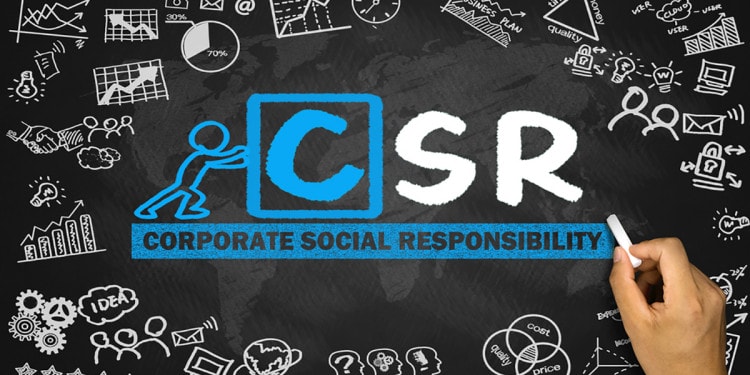Amongst the disMAY of Brexit, the divisiveness of Mr. Trump, and the dire drought of drone defences, there is something we can rely on: Corporate Social Responsibility (CSR).
Corporate Social Responsibility is an initiative that has, at least on the surface, changed the way businesses behave. Over time, this is a concept that is becoming more deep-rooted. And to ensure optimal outcomes, those who expose themselves to CSR best practice need a contemporary definition.
What is Corporate Social Responsibility?
To ask ‘what is CSR?’ is to ask ‘how many bacteria live on the human skin’ – there is no definitive answer. But that is not to say there is no commonality.
When we think of CSR, common themes include sustainability, equality, human rights, and refer to how CSR is an “approach to business” that organisations opt into.
This “approach to business” is our first issue with existing definitions. To be successful, we need to move past the mindset that considers CSR as secondary – the ‘add on’ to business. CSR needs to sit at the heart of the organisation, and should be a driver of cultural change from within the organisation itself. Only then can a brand be authentic in its CSR application.
Second, definitions are charged with failing to compel organisations to understand their impact long-term, thus organisations have got away with purpose-washing, and benefited from an improved bottom line without having a genuine impact on society.
Organisations need to be reporting on one’s CSR impact in parity, and with the same robustness, as financial accounting. If you aren’t inclined to read on … this is the lesson of the day.
But for those with a curious brain, what should CSR definitions look like in 2019? …
 IN THE PHOTO: BUSINESS STRATEGY PLANIFICATION PHOTO CREDIT: RAWPIXEL ON UNSPLASH
IN THE PHOTO: BUSINESS STRATEGY PLANIFICATION PHOTO CREDIT: RAWPIXEL ON UNSPLASH
Why definitions matters
There are a host of succinct definitions for ‘CSR’ available online, catering to the 15,000 searches per month seeking a “corporate social responsibility definition” on Google.
Definitions are important as they allow people to understand a concept, a term, or a process more richly. This is crucial, as comprehension of a topic allows an individual to more accurately act on an idea, apply it in their own lives and see it in action.
In the context of corporate social responsibility, in which real people are affected for good or for worse, it is extremely important to get the definition of ‘CSR’ right.
Should this be wrong or inconsistent, the success of CSR and its application is the real world is likely to be underwhelming. While the case for CSR has been exhausted, there is still a lot to be desired around how CSR should look, which leads us to thing that something may be missing.
No more Corporate Social Responsibility
Corporate. (adjective) relating to a large company or group.
Ergo, ‘CSR’ implies that social responsibility relies solely with a large company.
No. This is not the case. Being aware of one’s diversity, equality, sustainability behaviours and practices are not exclusive to large companies.
I understand the motive. Name dropping the ‘Corporate’ word will encourage adoption within major businesses – some of whom are more powerful than countries.
However, the responsibility of CSR is to be shared amongst private companies, governments, charities and social enterprises alike as we all contribute to the amounting issues facing society. Accordingly, we all need to play our part in addressing these issues.
Only by embedding healthy and consistent CSR practices across all organisations can we expect to see true change. Behaviours need to be aligned, pan-industry.
 IN THE PHOTO: CSR IN THE CENTRE OF THE TABLE PHOTO CREDIT: SECO
IN THE PHOTO: CSR IN THE CENTRE OF THE TABLE PHOTO CREDIT: SECO
Beyond the business case
Let me make this clear, the business case was needed to incentivise change. Without clear monetary benefits, CSR would’ve wholly fallen through. And ‘Social Return-on-Investment’ has been instrumental in promoting confidence in a CSR approach.
Now there is consensus on the business benefits, there needs to be a new shift in focus. In 2019, businesses should be willing to commit to CSR practices regardless of the monetary benefits achieved by a business. They should do so for the social impact. Brands need a purpose.
The purpose of CSR, in quite a holistic sense, should be about creating a positive, more inclusive and diverse culture for organisations, employees, and communities. With a particular focus on the greater positive experiences of our societies, environment, and well-being. In many of these instances, these are capturable in terms of money. But we stress, it should be about the deeper benefits that are rewarded to the society, not just the business.
We promote the mindset that both outcomes are both relevant and crucial for their own reasons, but both should be acknowledged and measured in their own right.
 IN THE PHOTO: TRIPLE IMPACT DRAFT PHOTO CREDIT: Gerd Leonhard
IN THE PHOTO: TRIPLE IMPACT DRAFT PHOTO CREDIT: Gerd Leonhard
Not just a noun
One of the strongest criticisms about the term corporate social responsibility, is that it is simply that – a term.
CSR, at its most effective, and (forgive the pun) impactful, when it is considered a more than a noun, a verb. An action word. Something that is done. Not just a meaningless entity without substance.
CSR definitions need to reiterate the importance of having a tangible impact. If the specific CSR project or strategy is futile in its ability to effect change, then it is fundamentally not worth doing.
Resources, in terms of investment, staff time or any other business assets need to be strategically utilised in order to experience true CSR transformation. Failure to do so, will reinforce negative perceptions of corporate social responsibility and its value.
Omission of Measurement
It is not an overstatement when we say that most CSR definitions fail to mention the importance of CSR reporting.
Despite devoted advocacy for doing business better, little to no reference is made to measuring the impact of these commitments and there is less enthusiasm in accurate, transparent, data-driven insights.
CSR shall not develop, nor improve, nor deliver greater outcomes without solid insights that can be used to inform future projects.
We reiterate, organisations need to be reporting on one’s CSR impact in parity, and with the same robustness, as financial reporting.
Perhaps CSR is outdated in and of itself. Perhaps when we are thinking about ‘businesses doing good’ and acting ‘responsibly’, we need to reassess what it is we are thinking about.
Sustainability to abundance.
Gender diversity to social diversity.
Water wars to data wars.
Who knows what the future will bring.
What we do know, is that CSR has the power to positively influence what that future looks like, and a more refined, up-to-date definition is key in shaping that future.














